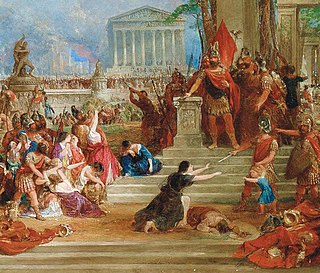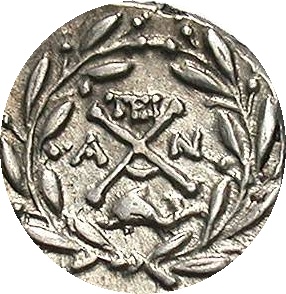Related Research Articles
Year 146 BC was a year of the pre-Julian Roman calendar. At the time it was known as the Year of the Consulship of Lentulus and Achaicus. The denomination 146 BC for this year has been used since the early medieval period, when the Anno Domini calendar era became the prevalent method in Europe for naming years.
AD 51 (LI) was a common year starting on Friday of the Julian calendar. At the time, it was known as the Year of the Consulship of Caesar and Scipio. The denomination AD 51 for this year has been used since the early medieval period, when the Anno Domini calendar era became the prevalent method in Europe for naming years.
This article concerns the period 149 BC – 140 BC.
Lucius Accius, or Lucius Attius, was a Roman tragic poet and literary scholar. Accius was born in 170 BC at Pisaurum, a town founded in the Ager Gallicus in 184 BC. He was the son of a freedman and a freedwoman, probably from Rome.

Lucius Mummius, was a Roman statesman and general. He was consul in the year 146 BC along with Gnaeus Cornelius Lentulus. Mummius was the first of his family to rise to the rank of consul thereby making him a novus homo. He received the agnomen Achaicus for his victories over the Achaean League destroying the famous ancient city of Corinth, at that time a leading city of the League, as part of his campaign. Mummius' victory over the Achaean League and the sack of Corinth placed Rome firmly in control of all Greece from a political standpoint - something Rome had avoided doing even though their involvement in the Greek East dated back as far as 226 BC when they confronted Illyrian piracy. The destruction of Corinth marked the end of free Greece.

Achaia, sometimes spelled Achaea, was a province of the Roman Empire, consisting of the Peloponnese, Attica, Boeotia, Euboea, the Cyclades and parts of Phthiotis, Aetolia and Phocis. In the north, it bordered on the provinces of Epirus vetus and Macedonia. The region was annexed by the Roman Republic in 146 BC following the sack of Corinth by the Roman general Lucius Mummius, who was awarded the surname "Achaicus". Initially part of the Roman province of Macedonia, it was made into a separate province by Augustus.

The Achaean League was a Hellenistic-era confederation of Greek city states on the northern and central Peloponnese. The league was named after the region of Achaea in the northwestern Peloponnese, which formed its original core. The first league was formed in the fifth century BC. The second Achaean League was established in 280 BC. As a rival of Antigonid Macedon and an ally of Rome, the league played a major role in the expansion of the Roman Republic into Greece. This process eventually led to the League's conquest and dissolution by the Romans in 146 BC.

Hellenistic Greece is the historical period of the country following Classical Greece, between the death of Alexander the Great in 323 BC and the annexation of the classical Greek Achaean League heartlands by the Roman Republic. This culminated at the Battle of Corinth in 146 BC, a crushing Roman victory in the Peloponnese that led to the destruction of Corinth and ushered in the period of Roman Greece. Hellenistic Greece's definitive end was with the Battle of Actium in 31 BC, when the future emperor Augustus defeated Greek Ptolemaic queen Cleopatra VII and Mark Antony, the next year taking over Alexandria, the last great center of Hellenistic Greece.
Lucius Varius Rufus was a Roman poet of the early Augustan age.

Quintus Caecilius Metellus Macedonicus was a statesman and general of the Roman Republic during the second century BC. He was praetor in 148 BC, consul in 143 BC, the Proconsul of Hispania Citerior in 142 BC and censor in 131 BC. He got his agnomen, Macedonicus, for his victory over the Macedonians in the Fourth Macedonian War.

Tenea is a municipal unit within the municipality of Corinth, Corinthia, Peloponnese, Greece. The municipal unit has an area of 167.575 km2 (64.701 sq mi). Until 2011, it was a municipality whose seat was in Chiliomodi.

The Battle of Corinth of 146 BC, also known as the Battle of Leucapetra or the Battle of Lefkopetra, was a decisive engagement fought between the Roman Republic and the Greek city-state of Corinth and its allies in the Achaean League. The battle marked the end of the Achaean War and the beginning of the period of Roman domination in Greek history, and is also notable for the complete and total destruction of Corinth by the Romans in its aftermath.
Lucius Junius Gallio Annaeanus or Gallio was a Roman senator and brother of the famous writer Seneca. He is best known for dismissing an accusation brought against Paul the Apostle in Corinth.

Butades of Sicyon, sometimes mistakenly called Dibutades, was the reputed inventor of the art of modelling clay in relief, which an accident first led him to practise, in conjunction with his daughter, at Corinth. The period at which he flourished is unknown, but has been put at about 600 BC.
Marcus Cornelius Cethegus was a Roman Republican consul and censor during the Second Punic War, best known as a political ally of his kinsman Scipio Africanus.
Arruns Tarquinius was the younger son of Demaratus of Corinth, who migrated to the Etruscan city of Tarquinii in the seventh century BC. He died shortly before his father, leaving his wife pregnant. When Demaratus died, he left no inheritance for his grandson, also named Arruns, who was thus born into poverty, although Demaratus had been wealthy. The child came to be called Egerius, meaning "the needy one."

Arruns Tarquinius, commonly called Egerius, was a member of the royal family of early Rome.

Corinth was a city-state (polis) on the Isthmus of Corinth, the narrow stretch of land that joins the Peloponnese to the mainland of Greece, roughly halfway between Athens and Sparta. The modern city of Corinth is located approximately 5 kilometres (3.1 mi) northeast of the ancient ruins. Since 1896, systematic archaeological investigations of the Corinth Excavations by the American School of Classical Studies at Athens have revealed large parts of the ancient city, and recent excavations conducted by the Greek Ministry of Culture have brought to light important new facets of antiquity.

The Achaean War of 146 BC was fought between the Roman Republic and the Greek Achaean League, an alliance of Achaean and other Peloponnesian states in ancient Greece. It was the final stage of Rome's conquest of mainland Greece, taking place just after the Fourth Macedonian War.
The gens Mummia was a plebeian family at Rome. Members of this gens are first mentioned after the Second Punic War, and within a generation, Lucius Mummius Achaicus became the first of the family to obtain the consulship. Although they were never numerous, Mummii continued to fill the highest offices of the state through the third century AD.
References
- ↑ "Mummii". Mek.niif.hu. Retrieved 2013-10-24.
- ↑ Harry Thurston Peck, ed. (1898). "Mummius". Harpers Dictionary of Classical Antiquities. www.perseus.tufts.edu.
- ↑ Chisholm, Hugh, ed. (1911). . Encyclopædia Britannica . Vol. 18 (11th ed.). Cambridge University Press. p. 967.